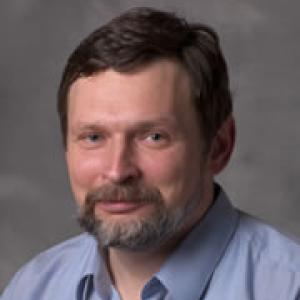
Yury Chernoff
Professor
Director, Center for Nanobiology of the Macromolecular Assembly Disorders (NanoMAD)
Yury O. Chernoff is a professor in the School of Biology and Institute for Bioengineering and Bioscience and Editor-in-Chief of the scientific journal Prion. He received his undergraduate and graduate training and Ph.D. degree in biology from St. Petersburg (then Leningrad) State University (Russia) and performed postdoctoral research at Okayama University (Japan) and University of Illinois at Chicago.
Major topics of Dr. Chernoff’s research include yeast models for the protein aggregation disorders with an emphasis on the cellular control of protein aggregation and prion propagation, sequence-specificity of amyloid formation, and evolution of prion properties.
Dr. Chernoff’s work provided the first experimental evidence for the chaperone role in prion phenomena.
yury.chernoff@biology.gatech.edu
404-894-1157
Office Location:
EBB 5016
Georgia Institute of Technology
Yeast genetics and molecular biology, chaperones and protein misfolding, amyloid and prion diseases, epigenetics and protein-based inheritance. Mylaboratory employsyeast models to studyprionsandamyloids.Prionswere initially identified as proteins in an unusual conformation that cause infectiousneurodegenerativediseases, such as "mad cow" disease,kuruorCreutzfeldt-Jakobdisease. Infection depends on theprion'sability to convert anon-prionprotein, encoded by the same host maintenance gene, into theprionconformation.Prionsform ordered cross-beta fibrous aggregates, termed amyloids. A variety of human diseases, includingAlzheimer'sdisease, are associated with amyloids and possess at least someprionproperties. Someamyloidshave positive biological functions. Manyproteins can formamyloidsin specific conditions. It is thought thatamyloidrepresents one of the ancient types of the protein fold. Some yeastnon-Mendelianheritable elements are based on aprionmechanism. This shows that heritable information can be coded in protein structures, in addition to information coded in DNA sequence. Therefore,prionsprovide a basis for the protein-based inheritance in yeast (and possibly in other organisms). Major topics of research in my lab include cellular control of prion formation and propagation (with a specific emphasis on the role of chaperone proteins), and development of the yeast models forstudying mammalian and humanamyloids, involved in diseases.Our research has demonstrated thatprionscan be induced by transient protein overproduction and discovered the crucial role of chaperones inprionpropagation, shown evolutionary conservation ofprion-formingproperties, established a yeast system for studying species-specificity ofpriontransmission,and uncovered links between prions,cytoskeletalnetworks and protein quality control pathways.
Research Affiliations: Center for Drug Design Development & Delivery, Center for Nanobiology of the Macromolecular Assembly Disorders - NanoMAD
IRI Connection:




